Last Updated on July 17, 2023
If you have played or watched baseball, you undoubtedly have heard some players call their coaches ‘Manager’. Are you as confused as I was? Well, in this article, I will tell you five astonishing facts about why baseball coaches are called managers.
In the world of baseball, there are several stories of managers who revived struggling teams. Love it or hate it, you can not change the fact that managers are super crucial for a team.
Regarding Major League Baseball and soccer, the head coaches are often called managers, while the guys in control of training are called coaches. What is the reason behind this? This article will help you make a professional impression in front of your manager on a ball field.
Duties of a Baseball Manager
The Manager is in charge of the daily operations of a baseball club, particularly when it comes to making choices during games. The Head Coach is the title given to the individual who fulfills these duties at the collegiate and amateur levels.
The General Manager is in charge of getting in and letting go of players. Team legends often become team managers. How many legends can you name? You can sharpen your knowledge of baseball legends by going through the list of 100 greatest baseball players in baseball history.
In the early years of baseball, the manager was usually a field captain. A field captain was responsible for making tactical choices on the field. This developed into the player/manager role, which was quite widespread before World War II.
Managers in baseball differ from those in other sports in that they often dress in the team’s jersey rather than in casual clothing. Ununiformed managers are restricted to the dugout throughout the game and are not permitted to enter the field to instruct the players or speak with an official.
The manager is in charge of human resources and tactical and strategic planning. He is in charge of ensuring team chemistry, enforcing discipline, and outlining each player’s position. A manager is also a baseball skill instructor and a technical fault fixer for his players with the help of coaches.
Moreover, when an umpire makes an unpleasant or incorrect ruling against his players, he is also required to advocate for them in the media and to argue for them in court.
Among the tactical responsibilities of the manager are decisions on who will play regularly and who will fill in on the bench, as well as how much playing time each player should get.
The duties of a manager include the following-
- Building a lineup
- Designing a proper baseball practice plan
- Substitutions in-game
- In-game Tactics
- Clubhouse policy-making
- Conducting drills and providing training on the field
- Taking questions from the press
- Having a long-term plan
- Encouraging excellence
Having a manager who succeeds at these different responsibilities is relatively uncommon.
When evaluating a manager’s worth, fans prefer to focus on the most immediate aspects of on-the-field tactics. However, the front office employees tend to focus more on long-term aspects like clubhouse harmony, player development, and the ability to follow an organizational strategy or philosophy.
Pitching is fun. I cannot deny that. If you are interested in pitching too, then you should know what are the best pitches to throw in baseball.
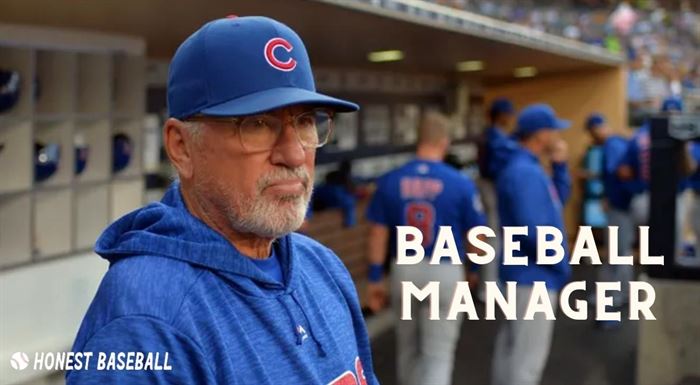
Let us go through the duties of a baseball manager in great detail-
Building a lineup
A baseball manager selects the starting lineup for a game. This encompasses the batting lineup and defensive positioning.
This is an issue for the MLB managers to decide. Like any successful manager, they constantly seek advice from coaches and players.
Each player’s present health, the opposing pitcher’s matchup, and general team morale must be taken into consideration by a baseball manager. Most MLB teams have sophisticated analytic analysts that assist the manager regularly on his lineup.
The manager’s role necessitates extensive experience in the art of lineup formation. It not only affects the team’s success and failure, as well as the spirit of its players.
While sophisticated analytics may assist in assessing a player’s skills and weaknesses, managers must realize that athletes are not machines. Players like us have personalities and highs and lows.
A manager’s job is to put together a team that can play at the highest level. Building up a lineup, in my view, is a combination of art and science.
When addressing a manager, many fans criticize the lineup construction. There are several ways to place a lineup.
Keep in mind that managers are humans as well. Therefore they will have their ideas about how the team should be built. However, some fans favor managers who use traditional lineups.
Even if a manager implements a reasonable strategy, he will likely face criticism if the club is on a losing run. Fans may quickly critique lineup construction.
In-game Tactics
Managers may utilize various in-game strategies, including making substitutes while the game is still in progress.
The manager decides on a team’s strategic plan and when specific techniques are used. There is no limit to what a manager can do when delegating authority to subordinates.
Clubhouse policy-making
A manager will administer the clubhouse. At the organizational level, specific clubhouse regulations may be set. A manager’s commitment to building a culture of excellence can include implementing a clubhouse policy.
Conducting drills and providing training on the field
Though individual exercises are handled mainly by the positional coaches, baseball managers will stroll the field and check up on everything. This will include actively participating in activities and passively watching from a distance.
The manager is in charge of setting the practice plan and making decisions on how things are done. They often use Muhl Ball, Tee ball bat, and hitting net, etc.
Taking questions from the press
The manager acts as a spokesman for the team to the press. They hold pre-and post-game press conferences. This is a critical component of a manager’s job, but it is also a talent that is lacking in the majority of MLB managers.
Patience and solid communication skills are required when dealing with difficult questions. A favorable image of the team is fostered by a skilled baseball manager. Managers may utilize the press to encourage their players both positively and negatively.
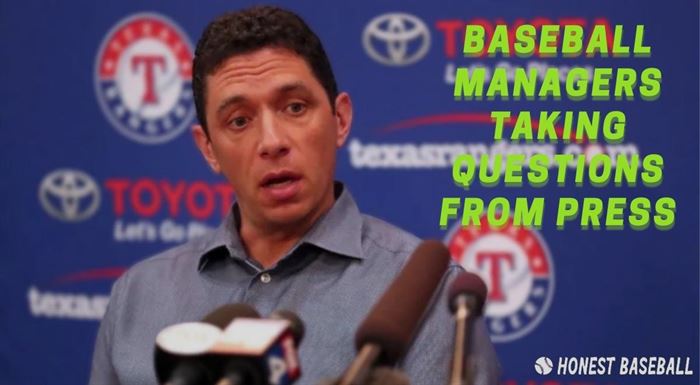
Encouraging excellence
A baseball manager must be able to work one-on-one with each of their players to provide instruction and feedback. However, macro-level leadership is likely the most crucial component of a Major League manager’s job.
Players must be held accountable for adhering to the regulations that maintain the culture.
Tone— The clubhouse’s general mood must be upbeat. The manager of a baseball team must ensure that the players and coaches have a positive experience. This has to be done with an eye on accountability, of course.
Team Leadership— The baseball manager is heavily involved in selecting team leaders. It is pretty uncommon for a team to go the whole season without a recognized captain. But a manager must know who his key players are and let them help him create a winning culture on and off the pitch.
Confidence— Baseball players suffer from extreme lows in confidence that is experienced by relatively few other sports. It is possible for hitters to get into a rut. A manager’s job is to inspire and maintain the confidence of his players.
Do you know baseball managers can also increase the confidence of the players from the dugout? You will often hear Baseball chants in a game. These chants dramatically increase players’ motivation for the game.
Long-Term Objectives — At the Major League level, baseball is a day-to-day discipline that requires dedication. Players’ concentration might be thrown off by the highs and lows of the game, which can lead to short-sightedness. A baseball manager should have season-long objectives in his team’s mind, even amid the daily grind.
Duties of Baseball Coaches
In Major League Baseball, you will see that many coaches are recruited to assist teams in running smoothly. They serve as the manager’s right-hand men, making lineup decisions and determining when and how players should be substituted.
Apart from the manager, the club may have over a half-dozen coaches who will work with him to ensure everything runs well on the field. A baseball coach is like an assistant coach in other sports most of the time. The manager in baseball is like the head coach.
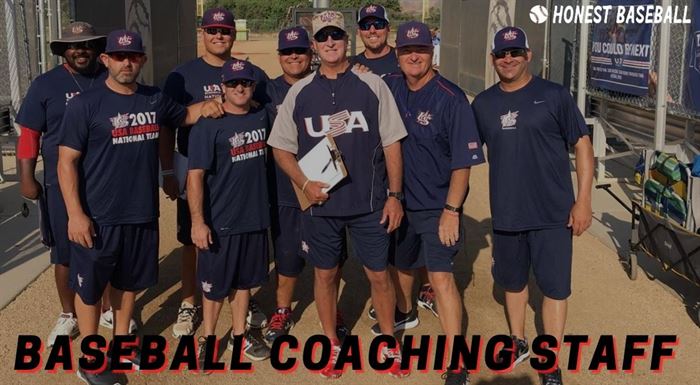
Now the question may arise in your mind: why are there so many coaches? Do they have any individual roles? Yes, they indeed do.
Bench coach
Bench coaches have lately taken on the role of second-in-command on teams. The bench coach assists the manager with in-game choices by providing situational assistance and bouncing ideas off the management.
A team’s bench coach steps in as a manager in the event of an absence or dismissal of the team’s manager.
Often, the bench coach is appointed as the interim manager when a team’s manager is dismissed or resigns in the middle of the season.
Preparation for training and matches and spring training are all roles of the bench coach. He also helps to set up and coordinate these activities.
Bullpen and Pitching coaches
Mentoring and training the pitchers are the responsibilities of a pitching coach. An in-game coach and advisor to the manager, he also acts as a mentor for the present pitcher.
In most cases, a manager visits the mound. The pitching coach initiates a pitching substitution or reviews the defense in a particular circumstance. However, whether discussing technique or how to throw to a specific hitter, the pitching coach is often the one that visits the mound.
Pitching coaches are typically former pitchers. Before the early 1950s, most pitching coaches were former catchers.
A bullpen coach is like a pitching coach, except he focuses on the bullpen’s relief pitchers instead. He does not go to the mound; he remains in the bullpen all game, dealing with relievers warming up. Most bullpen coaches are former pitchers or catchers.
Offensive coaches
- Hitting coach
Hitting coaches work with players to help them develop their form and skill. He keeps an eye on the players’ swings throughout the game and the season.
He advises them on how to improve their mechanics as needed in between at-bats. Moreover, he can use pitching machines to improve players’ swing, although there is debate over whether pitching machines are good for batting practice.
Also, he keeps an eye on how they are doing in the gym, in the cage, and in the batting cage before games. Nowadays, hitting coaches are using video to study their batters as well as to analyze the opposition pitchers, thanks to the advancement of technology.
With the use of video, a player’s swing can be analyzed and adjusted much more quickly. This is often referred to as video analysis.
- Base coaches
On-field coaches supervise their team’s at-bats from the dugout. Base coaches—first-base and third-base coaches, respectively—sit in dedicated coaches’ boxes.
They guide baserunners, prevent pickoffs, and communicate the manager’s instructions to runners and hitters. First-base coaches are in-charge of whether or not batters stop at first base. The third-base coaches are in charge of runners who have already reached there.
His primary responsibilities are to prevent runners from advancing from second or third base and make a split-second decision. Moreover, they also consider the opposing fielder’s arm strength and the pace and location of his baserunner.
Additional coaching duties
Coaches at the third base, first base, and the bench are often tasked with helping players improve in certain areas, like defense. The first-base coach is commonly chosen to cover a coaching void since the first-base coach’s practical in-game tasks are minor.
Other coaches
In addition, teams can hire specialists to assist athletes in various fields or hobbies. The term “coach” may appear in the title of these roles on occasion.
Uniformed coaches in Major League Baseball are limited. Hence those in these roles normally do not wear their uniforms during games. Athletic trainers and strength and conditioning coaches are in high demand.
Every MLB club has an athletic trainer, and most have a strength and fitness coach. There is also a catcher and batting practice pitcher. Some teams also hire extra coaches who do not have particular duties for their players.
Why Are Baseball Managers Called Skipper
Prior to each game, the manager selects the batting order and starting pitcher and makes substitutions during play, including when to use a reliever. That is why a baseball manager is referred to as a skipper.
The amount of power an administrator has over a game’s system varies across heads and games. Some managers oversee pitch selection like whether to throw a slider or curveball, defensive positioning, and pitch-out decisions, while others delegate these to an assistant coach or player.
Difference Between Baseball Manager And Coach
My first day in pro baseball was eye-opening when I figured out the difference between a coach and a manager. During a meeting with our manager, one of my teammates opened the topic by stating, “Hey Coach,…”
What happened next was utterly unexpected. The manager responded with a sharp “I am not a coach” and a serious expression. “I’m the manager.”
I was relieved that he did not say anything to me until it was only a matter of time until I made the very same mistake. I had never addressed someone as anything other than “coach” until that point in my life.
The top coaches know they are both a “coach” and a “manager” at the same time. They also understand that the skill eventually decides which one receives more focus. As coaches and managers, we want our players to be adaptable.
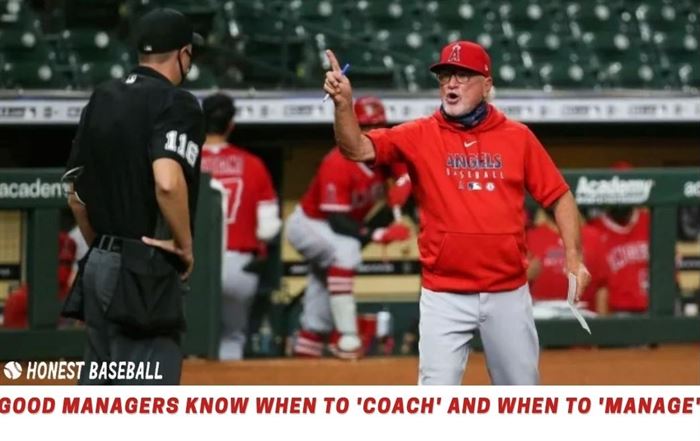
Responsibilities
When baseball was initially played, the position we now refer to as “manager” was called “captain,” and the captain was a player. As a player, the captain did not teach the team’s abilities, but he made game-day decisions on tactics and player selection.
Today’s manager is responsible for the lineup and the plan as in baseball. In contrast to almost every other sport wherein the top dog is referred to as a coach.
A coach, unlike a manager, must ensure that every player is improving. Because humans are famously lousy at self-evaluation, a coach must examine each player and devise a strategy for progress.
Having a coach is beneficial to all players, including those competing at the top levels. However, this is also true in baseball; however, the manager is not held solely responsible for it.
Is it better to be a manager or a coach when it comes to leading a team? I believe that the majority of leaders would want to be a manager. And besides, the leader is generally a team member, so it is difficult to tell your colleagues what they need to do to succeed.
However, if the team’s leader is not guiding them, who is? The majority of clubs do not have specialized coaches on staff. The “Manager” is in charge of the entire operation of the team, and he is usually visibly seated on the squad bench.
Each day, the manager determines which players will play, when to rest players, and when to make a substitute. He goes out onto the field and argues with an official when necessary in the game.
The manager will be going to the pitch to pull a pitcher from the competition. A number of additional coaches will support the manager.
Attire
Head coaches in professional football, basketball, and ice hockey dress in suits, jackets, or informal sporting-wear gear. It is generally embellished with club emblems or colors, as appropriate. Today’s baseball managers do not look much different from the players regarding uniforms.
The manager is dressed in the same team attire as the rest of the players. Coaches wear numbered team clothes, as well. This is a one-of-a-kind occurrence that only occurs in baseball.
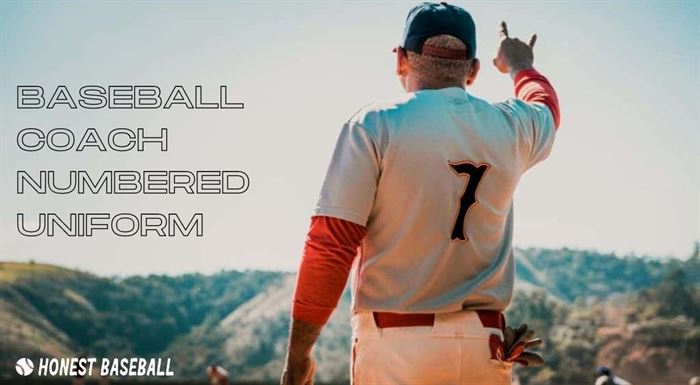
Frequently Asked Questions
1. What Makes a Good Baseball Manager?
Professional baseball teams perform better when they have a competent manager on their side. Coaches and managers have an essential role in a team’s success; they need to be able to inspire the dugout and motivate their players.
When it comes to motivating Major League Baseball players, yelling is not the best way to do it. If you want your team to have faith in your management, you need to be able to pull the most out of them. A good manager is one of the most critical facets of a team’s success.
2. What does DH stand for in baseball?
The designated hitter rule enables teams to bat to replace the pitcher by using another player. For defensive reasons, the designated hitter (or “DH”) is not allowed to play in that position on the field.
In 1973, the American League implemented the regulation, although pitchers continued to bat in National League games.
Some clubs use a full-time DH, while others use it to give one of their regular players a half-day off. Aging or injury-prone athletes who can no longer play defensive but still contribute at the plate might benefit from the position.
In fact, teams can leverage the DH position to maintain both of their powerful hitters, who can play the same defensive formation in the lineup. Due to the lack of a defensive component in the designated hitter position, the DH is often supposed to perform above average offensively.
3. How many times can a manager visit the mound?
The coaching staff may visit the pitch once every inning without removing the pitcher from the game. If the same pitcher is called to the mound twice in the same inning, the pitcher is taken out of the game.
4. Can MLB Managers Play in a Game?
Yes! Managers are allowed to participate in MLB games. However, they must be on the team’s official lineup to join due to the limit on MLB rosters.
The decision to play manager means giving up an available roster that might normally be utilized for a vital team member. Team members might save money by doing two tasks with one employee.
If a player is particularly well-liked, keeping him on as a player-manager later in his career may help increase attendance. Because managing in the Major League takes years of experience, they are often not young when they start managing and playing for a team.
5. Do MLB umpires pay for their travels?
The simple answer is NO! MLB pay for their plane tickets. Along with the players, managers, and coaches, MLB umpires also have to travel a lot. You can learn more from Do MLB Umpires Pay For Travel.
6. Are there managers in other popular sports?
Yes, managers are employed in various sports, most notably soccer and rugby. However, at least in professional soccer, the person in charge is called the head coach, and some serve as both head coach and general manager.
Some argue that the difference in terminology is simply an issue of geographical preference, like football and soccer. It is the same thing but with a new name.
Conclusion
Baseball managers and coaches are both important for a team. While the coaches are putting together the squad, the manager must use the chess pieces provided by the coaches in order to win. They work in every possible way to get the best out of their players.
In this article, I described the duties of a baseball manager and coach and why baseball coaches are called managers. I hope you have a great time with your coaches.
Do not mistake a manager for a coach, as my friend did, now that you are aware of why baseball coaches are called managers.
You might be interested in
How Much Does A Baseball Coach Make In A Year
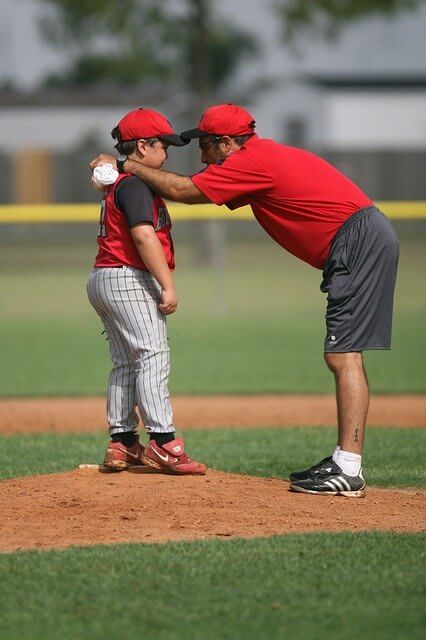
Hello everyone. My name is Jason Butler, and I live in California, America. I was a professional AAA Minor League Baseball player. I lost my chance of playing MLB for injury issues, but I did not lose my love for baseball. I attended the coaching training program and am now working as a coach in a small school in San Diego.
I always love to share my experience and knowledge if that can help you. Play baseball, and stay fit.
